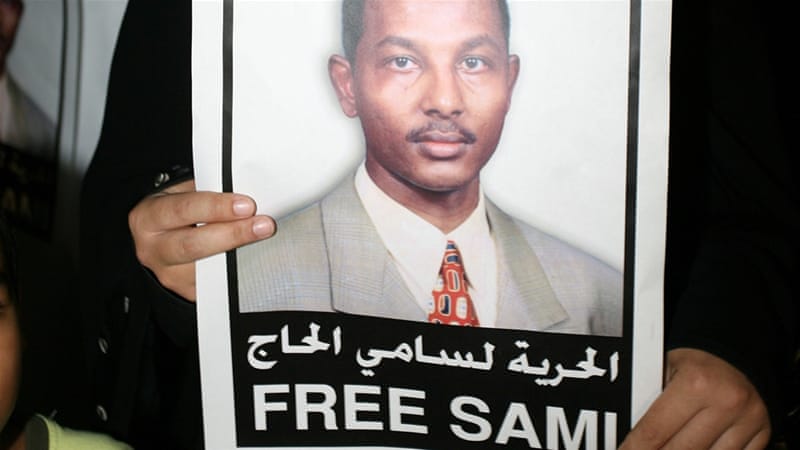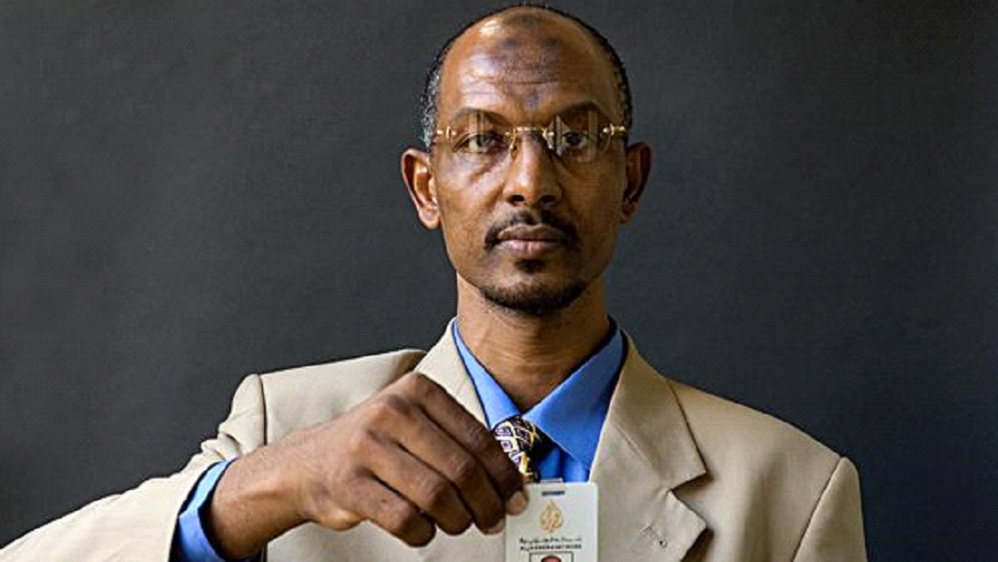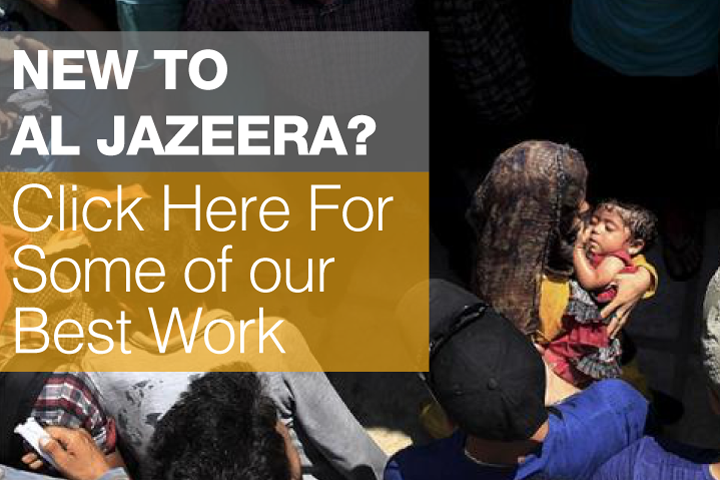Guantanamo Bay
Al Jazeera's Sami al-Hajj reflects on how the years he spent as a prisoner in the US detention camp changed his life.

When it was time to go to university, I left home and headed for India, where I spent five years studying political science and sociology. But I always maintained my passion for the media.
Upon returning to Sudan, I worked for my father for several months, and then made my way to the United Arab Emirates. It was while I was there that I heard about a new channel that was being set up in Qatar – Al Jazeera. I felt compelled to join.
When I was eventually taken on, it was with the intention that I would become the channel's Chechnya correspondent. My wife is from the region and I had a deep interest in it.
But then 9/11 happened and everything changed.
Pakistan
On October 7, 2001, I found myself in Pakistan, preparing to cross over into Afghanistan to cover the war there as an Al Jazeera cameraman.
A few days later, on October 11, we crossed from Quetta, on the Pakistan side of the border. The US had been bombing Kabul and the north of the country, but on that night they were also attacking the airport in Kandahar. That was where we were heading – the Taliban's power base.
In Kandahar, the Taliban kept a close eye on journalists and their work. We would have to get permission to film and would then be accompanied by a Taliban official. On one occasion, I covertly used a small camera as we made our way to a marketplace – hoping to capture an uncensored image of the city and its residents. We were caught, arrested and detained in a mosque for 12 hours.
As the war continued, we crossed back and forth between Afghanistan and Pakistan.
We had become well known to the border guards and, as an African face in Pakistan, I wasn't easily forgotten. Which is why it came as a surprise when, on December 15, as we attempted to cross back into Pakistan, I was stopped.
The Guantanamo files: Dozens held were innocent
I remember the day clearly. It was the last of Ramadan. The Taliban had been pushed out of Kandahar and Al Jazeera wanted us to report on life in the city after their departure. I was worried about the route in, but felt relieved when we arrived at the border crossing and found it full of journalists. There must have been about 70 of us, from all over the world.
But they wouldn't let me cross.
I knew the border guard who stopped me. They had a paper, he said, directing them to arrest "Sami, the Al Jazeera cameraman". It all seemed relatively innocuous at the time; it must have been some kind of mistake. The guard acknowledged that I was a journalist. We spoke calmly, politely even. An intelligence officer came.
READ MORE: Growing Up Guantanamo
At one point, they gave me the option of taking my passport and heading back to Islamabad. But I had a job to do, and felt sure that this would all be resolved soon.
I spent the night in the border guard's office. The next day, he telephoned the intelligence officer. Either come and take him, or I'll let him go, I heard him say. Thirty minutes later, the intelligence officer arrived. I was taken to their office and arrested.
|
That flight felt like something from a horror film. We were beaten
randomly. By the time we landed, our feet were numb from the cold, our
bodies frozen stiff. |
I was free to move around their office and allowed to call my family. They even brought a doctor to see me when my cold grew worse.
But the hours turned into days – I would spend 23 there in total.
During that time, I'd listen to the news on a small radio. One day, there was a report about an incident involving an Arab prisoner; he had attacked some Pakistani guards on a bus and escaped. After that, I noticed an armed guard outside my room.
Bagram
Then, one night, I was moved.
I was taken to the airport with a group of Arabs. There were around 25 to 30 of us. We were handed over to American soldiers. Bags were placed over our heads and we were handcuffed in a human chain. Then we were loaded into a military cargo plane.
That flight felt like something from a horror film. We were beaten randomly. By the time we landed, our feet were numb from the cold, our bodies frozen stiff. We were rolled out of the plane and on to the runway. I twisted my ankle as I fell.
This was Bagram airbase and we were now in American custody.
The soldiers were so hyped up, so angry; theirs was the sort of aggression that could only come from extreme fear. They strip searched us and asked why we were fighting America. Most of them truly seemed to believe that we were enemies in some kind of Holy War.
They began to question me about Osama bin Laden. They thought I'd interviewed him for a report that had been broadcast on Al Jazeera some weeks earlier. They wanted to know what I knew of his whereabouts.
Of course, they were mistaken. I had never met nor interviewed Bin Laden. But their questioning revealed that, even if this was a case of mistaken identity, they were in no doubt as to the fact that I was a journalist.
Guantanamo remembered: A personal perspective
Looking back on it, I believe that the Pakistanis who handed me over were fully aware that I wasn't the "Sami" the Americans were looking for. But they were playing their own game. I simply got caught up in their bid to convince the Americans that they were cooperating – and I strongly doubt that I was the only one.
But Bagram was brutal. We were held in a hangar, with 20 prisoners to a cage. We weren't allowed to move, talk, stand or look at one another.
I wondered about the other prisoners there with me and wished I could know their stories.
I even listened in on the conversations between the soldiers, hoping to glean some kind of insight into their lives. Most of them seemed so young. They would take pictures of each other as they posed, Rambo-style, in front of a US flag.
I was only interrogated once at Bagram, but the air of intimidation was ever-present. And the noise was constant – dogs barking, planes landing and taking off, guns being fired, people screaming.
I couldn't understand why they were treating us like this. This wasn't the America I knew from the films I'd seen. I kept getting flashbacks to those movies, and trying to reconcile them with what was taking place around me.
I reminded myself that this would at least make for an interesting story, if I was ever able to write it.
Kandahar
After 17 days in Bagram, I was transferred to Kandahar.
The conditions were better there. We stayed in tents – 15 prisoners to each. But the psychological torture continued. They would make us watch as they dropped the Koran into the toilet buckets; they would try to make us feel uncomfortable in any way they could.
I remember once overhearing a soldier say: "Let's torture them, because they wanted to kill us."
I was questioned about Al Jazeera. They again acknowledged that I wasn't the person they had been looking for. But still I wasn't released.
Every month, they sent 40 or so prisoners somewhere else. At first, I didn't know where this "somewhere" was. But I gradually came to learn about a place called Guantanamo.
After five months, I was among the last group of prisoners from Kandahar to be sent there.
Guantanamo
The flight took a day or so, it was hard to tell exactly how long. We went first to Turkey, where we switched planes at an American airbase.
We flew in a cargo plane, seated on a log with soldiers standing behind us. We wore headphones and goggles and had our mouths covered the entire time.
There was no eating or going to the toilet. Back in Kandahar, once people learned that they were being transported, they would stop eating or drinking the day before. But still people wet themselves during the journey.
When we landed at Guantanamo, we were taken one by one for a medical check-up and to have our fingerprints and photograph taken.
I was sent straight for interrogation. Three people questioned me – one from the CIA, one from the FBI and another from military intelligence. It lasted for about three hours.
The process of breaking us down began immediately. And it never stopped.
Sleep deprivation was a key component of their psychological torture. I was once prevented from sleeping for seven consecutive days.
Then there was the time, after one round of interrogations, when a male soldier and a female soldier had intercourse in front of me.
As these things happened, I would go somewhere else in my mind – memorising the Koran or calculating prayer times.
|
There were some soldiers of colour who treated us more humanely than
the others. I remember one, in particular, who explained that he was
only doing what he did because he had to follow orders. |
"Let God come and save you," the soldiers would sneer.
There were so many restrictions. We weren't allowed to talk or to stand while we were in our cells. We were only allowed to take a shower once a week and when we did, we were forced to walk naked from the cell to the shower.
There were some soldiers of colour who treated us more humanely than the others. I remember one, in particular, who explained that he was only doing what he did because he had to follow orders.
When it became clear that we weren't going to be released and that our conditions weren't going to improve, some of us embarked on a hunger strike. The European prisoners had suggested it as a way of negotiating. It became a form of protest.
We were already so hungry that it wasn't hard to do, especially once we realised that freedom was more precious than food. We would drink water, but wouldn't eat anything. It was our way of resisting.
But, after 30 days on hunger strike, the force-feeding would begin. It is hard to convey just how traumatic this is. It became a form of torture in itself.
They would tie us up by our hands and our legs and then force a tube up our nose. Most of the time, the fluid would enter our lungs. We'd be coughing and choking as our lungs filled with liquid. Often, they'd over-feed us so that we vomited. But even as we threw up, they'd keep on going. The vomit would dry on our faces and bodies. We weren't allowed to clean it away so the smell became unbearable. And they'd use the same tube for multiple prisoners without cleaning it.
 |
| Sami's colleagues held regular events to mark his detention in Guantanamo and to ensure that he was not forgotten [Al Jazeera] |
When some of the African American soldiers showed me the press coverage of the hunger strike, it inspired me to keep going. I could see that it was having an impact. I would only eat once I was out of Guantanamo, I vowed.
A campaign had already been started by Haissa Manna to secure my release and there were many behind-the-scenes efforts taking place.
Then, finally, in 2008, my lawyer, Clive Stafford Smith, told me that I was being freed, along with eight others.
I arrived in the Sudanese capital, Khartoum, on May 1, 2008.
 |
| Sami was taken to hospital in Khartoum immediately after his return to Sudan [Al Jazeera] |
During my time at Guantanamo, I met around 90 percent of the inmates there. And I can tell you that none of those I met had ever been a threat to the US. They were all young men – some were Afghan farmers or Uighur refugees escaping persecution in China; others were humanitarian workers.
Very few detainee cases have ever gone to trial. And today, there are still innocent people – people who have been told that they pose no threat – in Guantanamo.
Read more: Life after Guantanamo
It is an inhumane place; an insult to humanity.
Even American leaders understand that it has tarnished their country's reputation. And to other countries – those with already appalling human rights records – it sent a clear message: do as you please.
When I was finally free, I understood that it was my duty to link my journalism to human rights. I was in a unique position as a journalist who had personally endured such grave human rights abuses. It became my mission.
The Human Rights Centre
Given the work that we do, and the stories we tell, it made sense for Al Jazeera to champion this cause. So we formed a unit focused on human rights.
The Human Rights and Public Liberties Centre prioritises human rights issues and makes itself available to journalists who suffer similar abuses worldwide.
They are, after all, the conduits for informing others of their rights, and their protection is key to our protection.
Journalists continue to face some of the toughest and most dangerous working conditions. In fact, they may be worse now than at any previous time.
 |
| Sami Al-Hajj became an international icon for those wrongly imprisoned around the world [Al Jazeera] |
What distinguishes us as a centre is the manner in which we collect and curate our stories. We work closely with organisations such as Human Rights Watch and Doctors without Borders.
We provide researchers, journalists and activists with a forum where ideas can be exchanged and stories told. We collaborate with human rights defenders and NGOs in exploring some of those stories neglected by the mainstream media, helping us to plug the gaps and set the agenda.
Take Al Jazeera's stance on the refugee crisis in Europe. By calling those fleeing war and persecution "refugees", rather than "migrants", we changed the discourse on their status in Europe. It is things like this that define us.
We do more than just tell the stories; we are advocates.
Newsrooms have experts on finance and politics, economics and sport. Why not have journalists who specialise in human rights, so that they may be better placed to tell more powerful stories?
A specialised branch reflects a commitment to prioritising human rights and producing better journalists.
And we believe that is the way forward if we are to hold countries, governments and organisations to account. It is the only way.
The story first appeared on the Human Rights and Public Liberties Centre website.
Read more: http://www.aljazeera.com/indepth/features/2016/01/sami-al-hajj-remembering-guantanamo-160106182602246.html

No comments:
Post a Comment